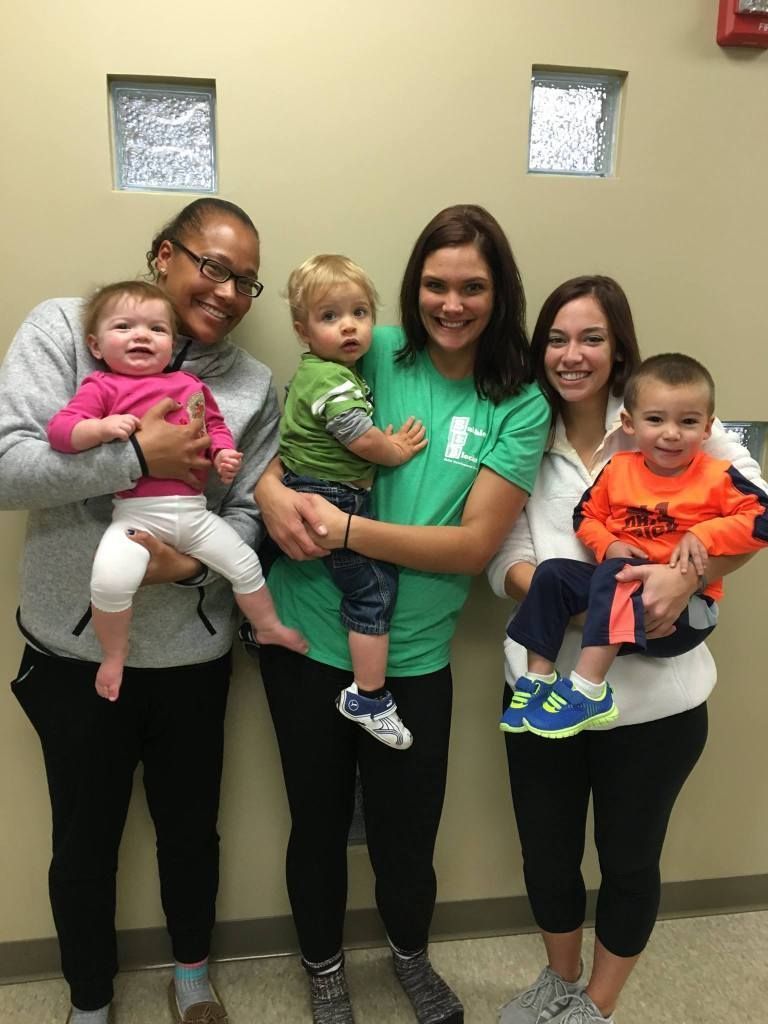
Stephanni Renn, Nebraska Children Vice President of Early Childhood Programs, said every provider shares a common trait. “You have to have a big heart to be in this business,” she said.
We could say the same about her and Nebraska Children.
Stephanni said that the Early Childhood team ensured that providers were supported in the application process.
“There wasn’t one person or initiative leading – everyone stepped in and did their part, even those not part of Nebraska Children,” she said.
“When this [CARES Act application review] started, we worked an extra 15-20 hours per week. When you’re doing another full-time job and asking a team to do this, it’s taking a lot of your time,” said Stephanni.
As the Early Childhood team began reviewing CARES Act applications, they encountered one of their first of many hurdles. Many providers neither had access to nor knowledge of computers. This lack of technology left some potential applications unaware that there was funding at all.
“We were making personal phone calls to [the childcare providers]. A lot of [them] did not have access to or know how to use technology,” said Stephanni. “We would say, ‘You can scan, or email pictures of receipts,’ and some of them didn’t know how to do that.”
Cory Quimby, the owner of several Lincoln Bubbles and Blocks locations, had a different but equally poignant experience with the pandemic. Cory opened a new location in March 2020. Little did he know the difficulties he and his business would face.
“With the new business, we had 60 kids signed up, but we opened with 12,” said Cory. “It was super-stressful in the first month, with our lease due at the same time!”
There were more setbacks for the Bubbles and Blocks team. When they opened the new location, they spent $600,000 in renovations. The pandemic worsened the financial blow.
“We had to shut down [some of our classrooms] because the kids or teachers tested positive,” said Cory.
Luckily, Cory said that he hasn’t shut down a room in a long while, so he feels as though, finally, he and his business are getting through everything.
Cory said that having other Bubbles and Blocks locations, however, is a godsend. “We’re lucky to have the other businesses. If this had happened eight years ago with one [center’s classrooms], we’d be out of business right now,” he said.
Still, Cory and his team display grit and resourcefulness.
“We offered [families] a discounted rate to hold their spots. Many took that; some didn’t. We said, ‘We don’t know how long this will last.’”
Despite Cory and his team’s strategy, their enrollment still plummeted, “Our enrollment dropped 50 percent,” said Cory. “We don’t HAVE a 50 percent profit margin; if you find a childcare center that does, then I’d like to talk to them!”
Cory said his teachers were affected by the pandemic as well, especially those with underlying health issues.
“Some teachers were diabetic, so they wanted to stay home. Some of the older teachers wanted to stay home, too, so we continued to pay them; we didn’t let anyone go.”
Cory said that he was glad to have received the $5,550 in CARES Act Stabilization Funds.
“When our $5,550 came through, we knew we’d survive, but we hadn’t bought new toys or books, and people were waiting on raises and we wanted to stay at our standards,” he said.
Cory said that using the funds to make payroll also allowed him to use his resources to acquire much-needed supplies for the children.
Since he was able to apply the funds to his center’s payroll, which is an authorized use, in so doing, Cory could utilize business resources to purchase other much-needed supplies for the children, such as books and other essential items.
Even with the vaccine available, Cory said that his business continues to deal with the repercussions.
“There have been weird and different problems than before [the pandemic],” he said, “Enrollment is VERY different. As people came back, we began taking whoever walks through the door. Now, we have extra young kids – a lot of infants. As people called to enroll, we took whoever called. The majority [of those children] tended to be younger.”
From there, Cory and his team had to do some shuffling. “We ended up with, at all three locations, our toddler rooms becoming infant or mixed-age rooms, but we can’t have more than 12 kids in those rooms.”
Cory said that this change has taken a toll on profitability. “Usually we’d have 18 kids [in a toddler room], and we had an extra teacher for those kids [beyond the staff and child ratio requirements], too,” he said. “We had to adjust to that, but hiring is also tough because the applications aren’t coming in just as quickly,” said Cory.
Unfortunately, this issue has extended to other childcare centers, too.
“A lot of centers are facing this problem,” said Cory. “So many places are hiring, but we’re losing our best people because with Target paying $15 per hour, it’s hard to compete.”
Cory said he continues to balance hope with an ever-shifting reality.
“I think there will still be a fear of what’s coming next, and it’s going to create a ripple effect, with parents not wanting to sign up or trust everything that [childcare providers are] doing,” he said.
Cory said that if a staff member won’t get vaccinated, there’s more financial difficulty that could come.
“Sometimes, young teachers don’t want to get a vaccine, so we have to shut down a classroom that costs us $8,000 in revenue for two weeks,” he said.
“I don’t think we’ll see anything quite to this scale in the near future, but it’s tricky. [COVID] is so hard to predict because we’ve been in survival mode.”
Cory said that he focuses on the bright side. “I see the light at the end of the tunnel; business has picked back up, people are crabbing about everyday things…Still, I don’t know how long or short people’s memories will be.”
Despite his optimism, Cory said that he’s undergone an undeniably hard time.
“This has been one of the most stressful years, but it’s also allowed me to accept that we were doing a good job before, and still doing a good job, even if someone isn’t 100 percent satisfied. Before, 99 [families] would be happy, and if one [family] was unhappy, I would focus on that. Now, I say, ‘Maybe this [center] isn’t right for you. Maybe we help you moving forward.’ As positive as I’m being, we’re not in the clear completely. We’re dealing with new customers, so we’ve not built a rapport with them. Before, we had families who had been here for three years. It is a very different world.”
As the world continued to change, so did Nebraska Children in our application reviewing processes.
“It really took everyone working together on establishing processes, and then writing down the processes—so we had an understanding among ourselves first. [Our Communities for Kids] team took a lead on this part,” said Betty.
From there, Betty said that the Nebraska Children marketing team created a Frequently Asked Questions page and an 800-number to address childcare providers’ questions or technical difficulties.
“We had people leading the team on the application process using Survey Monkey to make the application. We set up an 800-number, and a group email of a team of [Nebraska Children] staff, who volunteered to cover the 800-number,” said Betty. “The team was led by Steph Renn, and they worked like a well-oiled machine, although they may not have felt that way at times,” she said.
Betty said the Finance and Accounting team were incredibly helpful in this process.
Betty Medinger oversaw the Early Childhood team as they sifted through CARES Act applications and materials.
“Additionally, our Director of Community Investments, Jamie Anthony, and various staff in programs and contract management were critical in organizing files in SharePoint, reviewing documentation needed, approving providers for payments, and keeping track of everything needed to send to accounting to make payments,” said Betty.
Still, the team and providers encountered more hurdles. “This level of detail and review again took us to our staff working their ‘regular jobs’ and asking them to be part of this review process that became overwhelming,” said Betty.
Eventually, Betty said that the organization refined the processes and even hired additional staff.
When asked if there was a victory that stood out, Betty’s answer was straightforward.
“I feel like the story that stands out for me is that we pulled together, and everyone worked so hard…It was stressful at times for everyone, but people really rallied, and I was so impressed with everyone,” she said.
Meanwhile, as childcare providers anticipated the great unknown, Nebraska Children pivoted into foreign terrain as well. In addition to reviewing applications, the Early Childhood team began providing technical support for the process.
“We had to explain to providers how to scan a document [of a receipt] or how to take a picture and send it to us,” said Stephanni.
“The team each took a phone day; ALL day, we devoted ourselves to answering phone calls and responding to emails,” she said. “I have talked to at least 200 providers.”
Stephanni said that she felt a strong obligation to assist providers with the application process.
“It was different because in my normal job, there are fires, but not that sense that I’m potentially impacting someone’s life! That $5,550 could be their mortgage,” she said.












